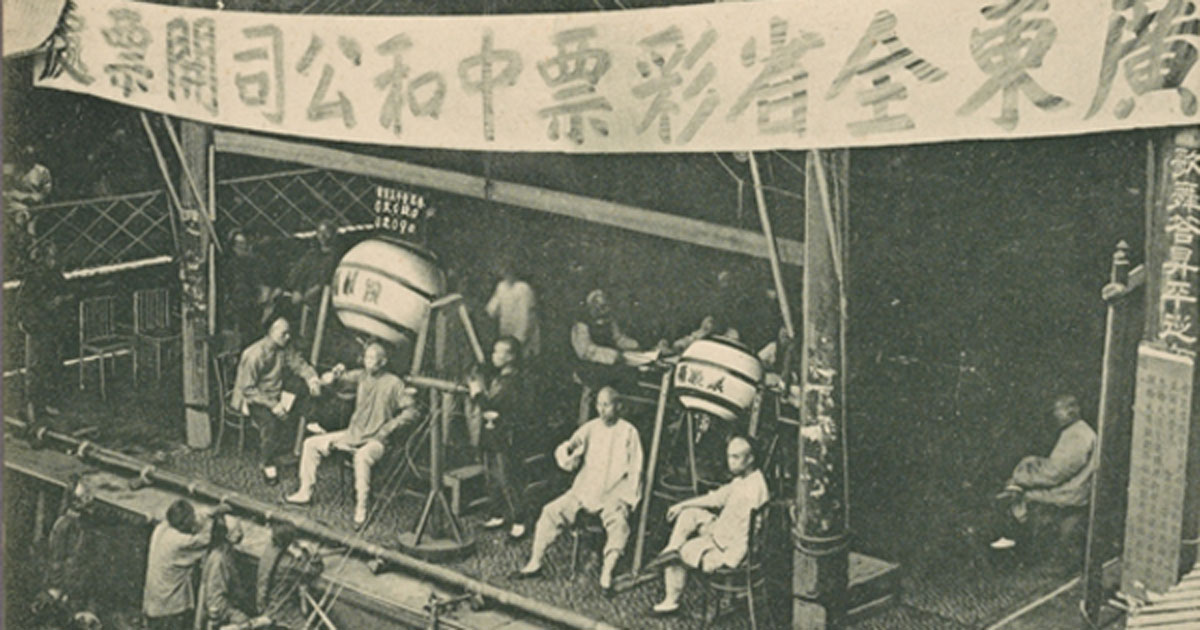From Dividing Biblical Lands to Avoiding Execution In Rome, Public Life Has a Long History of Lotteries
On the 19th of November 1994, the first draw of the UK’s National Lottery took place. The jackpot was worth £5.8 million and was shared between seven ticket holders. The history of lotteries, however, dates much further back. While today’s lottery winners win a monetary prize, this was not always the case, as prizes of a different sort were often offered by lotteries in the past.
Lotteries of Land, Office, and Death
Some have pointed out that one of the earliest examples of the lottery may be found in the Old Testament. In Numbers 34, for example, the land of Canaan was divided among the Israelites by lot. Another example of early lottery may be found in Greek city-state of Athens, where the majority of their government officials were chosen by lot. Male citizens above the age of 18 were eligible to place their names in a lottery and those whose names were drawn would be appointed. Yet another example of an ancient lottery was the Roman decimation. This was a form of military justice meant to punish units found to guilty of cowardice or insubordination. Instead of punishing the entire unit, a lottery would be used to select a number of men to be put to death.
- Gambling in Ancient Civilizations
- Are These Incredible Historical Coincidences Actually Due to Synchronicity or Mathematical Probability?
- Great Salt Lake of Utah gives up its Prehistoric Gambling Secrets from the 13th Century

Map of the twelve tribes of Israel – the land was divided by a lottery. (Kordas / CC BY-SA 3.0)
China’s Baige Piao
The lotteries mentioned previously bear little resemblance to those that people are familiar with today. One would need to look further east to find an ancient example of a lottery more like the one available today. During the Han Dynasty in China, there was a type of lottery known as ‘baige piao’ (meaning ‘white pigeon ticket’), which is the ancient equivalent of today’s keno. The popularity of this lottery allowed provincial governments in Han China to use it as a mean of raising funds for military or public works projects. It is also often said that this lottery helped finance part of the Great Wall of China’s construction.

Lotteries were used to raise funds to build The Great Wall of China. (Severin.stalder / CC BY-SA 3.0)
A Lottery Instead of Taxes
Returning to the west, the use of lotteries to finance civic projects may be traced to the reign of the Roman Emperor Augustus. During his reign, Rome was in urgent need of repairs. The emperor, however, could not raise the taxes as the people were already heavily taxed and unrest would break out if taxes were increased. Therefore, he initiated a lottery, which not only raised the funds Augustus needed but also increased his popularity. Unlike modern lotteries, however, the prizes given to the lottery winners by the emperor was not money, but valuable objects, properties, and even slaves.

Augustus initiated a lottery to raise money for Rome’s repairs. (scaliger / Adobe)
Where Was the First Lottery for Prize Money?
It was only during the 15th century that the lottery achieved its modern form, i.e. winners being given prizes in the form of money. Although it is not entirely certain as to when the giving of prize money to lottery winners first started, there are two possible contenders – the city of Bruges (in modern day Belgium) in 1466, and the Italian city of Modena in 1476. In Bruges, the lottery was used to raise money either for the fortification of the city’s defense or for providing aid to the poor. In Italy, the lottery became immensely popular. In spite of opposition from the Roman Catholic Church, which regarded it as a sinful activity, the lottery quickly spread to other cities as well. The Italian lotteries not only helped raise funds for public works projects but were also used for personal profit.
England’s First Nationwide Lottery
In England, the first nationwide lottery was held in 1567, during the reign of Queen Elizabeth I. The lottery was aimed at raising funds for the building of ships and the development of ports, which in turn would allow England to expand its export markets. The lottery tickets were sold at 10 shillings per piece, which was a huge sum at the time. The first prize was worth £5000, paid partly in cash and partly in plate, tapestries, and linen cloth. Additionally, all those who bought tickets were guaranteed freedom from arrest for all crimes except murder, felony, piracy, and treason.

English Lottery Scroll 1566 from the first recorded official lottery was chartered by Queen Elizabeth I. (Ronshelley / CC BY_SA 3.0)
The Lottery Continues as a Tool for Governments to Procure Funds
In the subsequent centuries, the lottery remained popular, as it was an excellent way of raising revenue without increasing taxes. The lottery was used to raise money, for instance, during the colonial era in the United States, as well as by the Founding Fathers later on, and by the French monarchy during the 18th century. Eventually, however, lotteries were outlawed in a number of countries. In France, for instance, the lottery was abolished in 1836 on the grounds that it exploited the poor, whereas several states in America outlawed lotteries during the 1870s. The lottery was also abolished in Great Britain in 1826. The lottery, however, would later be revived in these countries during the 20th century. Interestingly, the history of lottery in Italy is slightly different, where its first national lottery was created in 1863 following the Italian Reunification.
Top image: Lottery in China from 1910. Source: NYPL / Public Domain
By Wu Mingren
References
Andrews, E., 2016. 8 Notable Lotteries from History. [Online] Available at: https://www.history.com/news/8-notable-lotteries-from-history
Floss Books, 2008. 5 Things We Bet You Didn't Know About The Lottery. [Online] Available at: http://mentalfloss.com/article/18253/5-things-we-bet-you-didnt-know-about-lottery
Herman, R. D. & Glimne, D., 2013. Lottery. [Online] Available at: https://www.britannica.com/topic/lottery
National Gambling Impact Study Commission, 2019. Lotteries. [Online] Available at: https://govinfo.library.unt.edu/ngisc/research/lotteries.html
National-Lottery.com, 2019. History of Lotto. [Online] Available at: https://www.national-lottery.com/lotto/history
The British Library Board, 2019. The Great Lottery. [Online] Available at: http://www.bl.uk/learning/timeline/item102765.html
www.pinnacle.com, 2016. The history of lotteries. [Online] Available at: https://www.pinnacle.com/en/betting-articles/educational/the-history-of-lotteries/Z5YJXP3HEG45YM3Z




















Comments
Interesting article! Our civilization has passed a very long way and there have been many inventions in history.
Nowadays there are also a lot of new inventions.
For example, the Internet, where you can purchase goods. Which can be paid using cryptocurrency. You can use Bitcoin ( there is more about this https://bitcoinbestbuy.com/pay-online-stores/ ) and not pay a commission when paying.